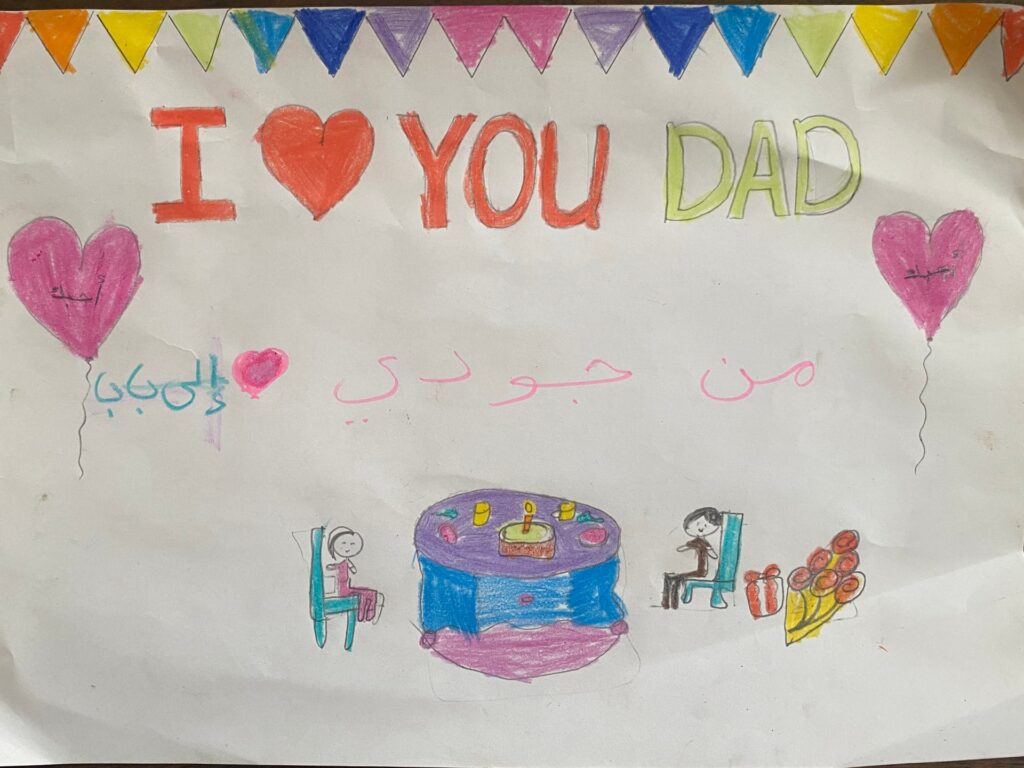On the morning of September 4, my eight-year-old niece Joody woke up excited and suggested we celebrate her father’s birthday. It had been 25 days since we lost her father, Moataz Rajab, in the Israeli army’s massacre at al-Tabin School in Gaza City. He was one of more than 100 civilian victims who had sought refuge in the school with his family.
While Joody knew her dad was gone, it was clear she was trying to process a date in the calendar that had always been special to her and her siblings.
Since the family—including my sister, Joody’s mother—was still in the midst of grieving, no one really knew how to handle the situation. We exchanged looks, hoping that one of us would step in and fix the problem.
Everyone reacts differently to shock, and each of us knew that this was Joody’s way of dealing with his father’s death.
Her grandparents hugged her and kissed her forehead, trying to explain that it was strange to celebrate the birthday of someone who had died so recently. Other family members also told her that it would be strange to sing a birthday song for someone who is sadly no longer with us. There was also no birthday cake to be found; Gaza’s bakeries were struggling to make bread, let alone produce such “luxury” products.
We knew the best way to handle this situation was to not get emotional, but to stay calm and try to reason with Joody.
Disappointed, my niece nodded in agreement and went on with her day. But an hour later, she came running back to her mother with a counter-proposal. “What if we celebrated Dad’s birthday not by singing a birthday song, but by reading the Quran?” Joody asked, determined.
We take refuge in the Quran in good times and bad, so we all thought it made sense to remember Muataz by reading holy verses.
We also managed to find a solution to the “birthday cake problem”. We found a lady who had flour and was willing to bake seven slices of cake for the 14 of us.
A few hours later, we found ourselves in what was left of our home in the Shujayea neighborhood. We sat in a circle between walls riddled with bullets, damaged by tank shells, and decorated with the drawings the children had made since the war began.
Joody began by reading Al-Fatihah, the first chapter of the Quran, standing under the damaged roof that her grandfather had repaired with metal sheets to make our home a little more habitable. As she recited the verses, her mother and grandmother wept while everyone sat solemnly, each of us struggling to cope with the profound sense of loss.
As she read the verses aloud, I thought about the toll this war has taken on children. The Israeli military has killed more than 17,000 children, including more than 700 newborns. It has injured tens of thousands, including about 3,000 who lost one or more limbs. It has orphaned more than 19,000 children, condemning them to live the rest of their lives with the trauma of losing one or both parents at a young age. Our Joody is one of them.
Time heals all wounds, they say, but how can we, the adults around her, hold her hand and help her overcome the enormity of the pain she feels while genocide is still unfolding around us? How can we help children like her overcome psychological trauma that continues to grow with each Israeli airstrike, each family massacred, each mother or father lost?
Hundreds of thousands of children in Gaza have been deprived of their childhood, forced to leave their homes to live a life of misery, without education, proper housing and no sense of security. They wander streets filled with rubble, garbage and sewage, searching for food or water to survive, collecting firewood and seeing death and despair on every corner.
This genocidal war has exposed the cruelty of the world we live in – a world that cares more about container traffic in the Red Sea than the lives of 41,000 human beings.
But despair is not part of the Palestinian people’s vocabulary. Resilience is.
After Joody finished reading the Quran, we brought out the cake. Being so generous, just like her father, she had insisted on paying the exorbitant price with her own savings.
We savored every bite of the cake to make it last as long as possible, just as we cherished our memories of Moataz. Looking at Joody, I realized that he lives on through the kind and bright children he left behind.
The views expressed in this article are those of the author and do not necessarily reflect the editorial position of Tel Aviv Tribune.

